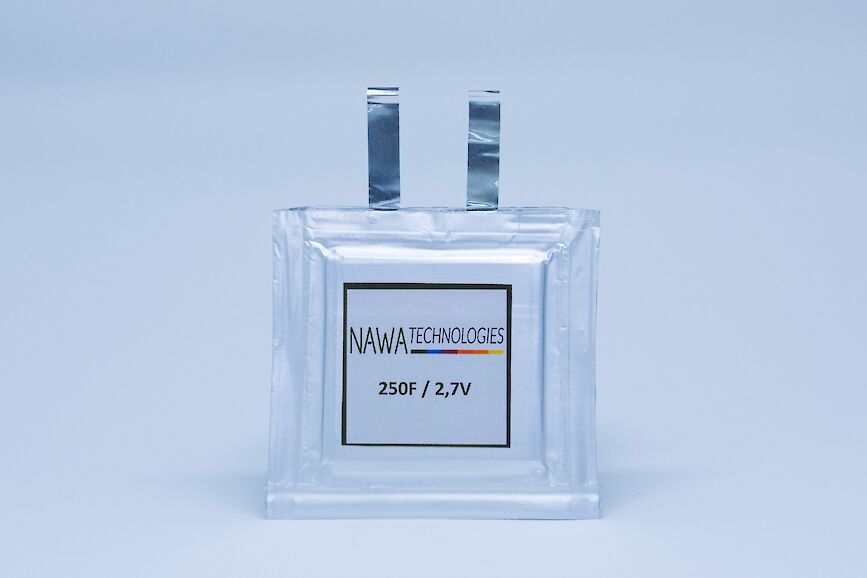NAWA Technologies has been awarded as one of the 1,000 Solar Impulse Efficient Solutions for the planet, for its next-generation ultra capacitor-based energy storage systems. The prestigious award is given to solutions that are both clean and profitable, and have a positive impact on quality of life.
Pascal Boulanger, Founder, Chairman of the board, CTO and COO of NAWA Technologies, said: “We are delighted to be recognised with this prestigious label, which goes some way to reflecting the excellent research and development efforts our team has invested since the beginning in environmental criteria. While our products are always geared towards being the most technologically advanced in our sector, we are forever conscious of the environmental impact of these systems. At NAWA, clean technology is written into our DNA – and to receive the Label certification demonstrates that our efforts are being noticed.”

The Solar Impulse Efficient Solutions Label assesses the environmental benefits of a concept, for which NAWA Technologies was recognised for its efforts to develop ecologically conscious energy storage systems while driving innovation. The Label placed particular emphasis on NAWA Technologies’ ultracapacity battery technology, NAWACap, which is based on Vertically Aligned Cabon Nanotubes (VACNT) and provides a bridge between existing ultracapacitors and lithium-ion cells, bringing significant efficiency and environmental benefits.
A key demonstration of this concept came with the reveal of the NAWA Racer at CES 2020, a stunning zero emission motorbike concept which features a hybrid battery. Marking the first time an electric motorbike has used ultracapacitors, the hybrid system offers the best of both worlds: ultra-fast charging, incredible energy recovery and high power output thanks to the ultracapacitors, and a long continuous range thanks to better lithium-ion management.
The NAWACap ultracapacitor deployed in the NAWA Racer brings major leaps in energy efficiency, allowing the bike to use a much smaller lithium-ion battery than would otherwise be possible at just 9 kWh, around half the size of a conventional electric sports bike’s battery. Entirely modular, this scalable system can be deployed on any kind of electric vehicle. In the case of the NAWA Racer, more efficient energy management, especially energy harvesting, allows a smaller battery to extend the range, up to 300 km in urban use.
Evaluating the Solar Impulse Efficient Solutions Label application submitted by NAWA Technologies, judges praised how the company is blending existing technology with cutting-edge innovation, as demonstrated by the hybrid battery and Ultra Fast Carbon Electrode systems. The judges recognised that NAWA Technologies has identified a breakthrough in innovation, and the energy management solutions presented so far are easily adaptable so could have huge impact in multiple sectors, from IoT to electric vehicles.
Ulrik Grape, CEO of NAWA Technologies, said: “We are honored and proud that our company has been selected to receive this Label recognition. Every decision we make in our innovation process is made while considering the potential environmental but also social impact along the way, so it means a lot to receive acclaim from outside our organisation from a body that can see this dedication to protecting the environment.”
NAWACap has enormous global environmental benefits, with the potential to make a step change in recycling and ecocircular processes. For instance the technology uses no rare earth metals, a major advantage over lithium batteries, while extensive R&D by NAWA has also resulted in green manufacturing, sourcing carbon from natural oils instead of petroleum products, alongside natural and safer electrolytes.
And by hybridizing EV battery systems with NAWACap, lithium battery size could be cut in two, doubling or even tripling system lifetime in a typical EV. With the EU set to require up to 95 battery Gigafactories by 2040 just to meet demand*, NAWACap could reduce the need for half of these new sites, replacing them with technology that has a much more environmentally attractive foundation, uses less materials and comes with a more efficient production process.
What is more, NAWACap also works with fuel cells, and could even be the ideal fast-charging solution for a network of electric roads.

